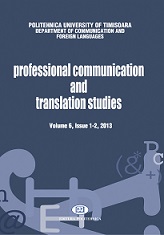WIE VIEL THEORIE VERTRÄGT UND BRAUCHT DIE TRANSLATORISCHE AUSBILDUNG?
HOW MUCH THEORY DOES THE TRANSLATION EDUCATION TOLERATE AND NEED?
Author(s): Vlasta KučišSubject(s): Language and Literature Studies
Published by: Editura Politehnica
Keywords: translation; theory; practice; translation competency; multilingual communication
Summary/Abstract: Translation is a complex transcultural activity, in which knowledge and action are closely connected. If one observes translation as a professional activity (trade) which is realized on the basis of a contract and has the function of establishing constructive border-crossing communication, this raises the question of how much theory an academically educated translator requires to successfully participate in the multi-language and multi-culture market. The EU defines translators as experts for multilingual and multimedia communication. Apart from linguistic competencies, this sort of communication requires professional competency, intercultural competency, technical competency, as well as research and service competencies in order to measure up to the requirements of the knowledge-based society. The following thesis analyzes current trends on the turbulent market for translators and draws attention to the gap between science and practice. In practice, professional translation is often not done in a sufficiently competent manner. In theoretic explanation, the translation theory concepts and models are rarely related to the problems in the translators' professional practice. This begs the question of the optimum balance between theory and practice in the current university translation education.
Journal: Professional Communication and Translation Studies
- Issue Year: 2013
- Issue No: 6
- Page Range: 177-184
- Page Count: 8
- Language: German

